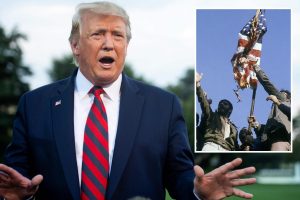Iran vows to ‘bring down Donald Trump in 2020 election like it toppled Jimmy Carter after humiliating failure of 1980 hostage crisis – The Sun

IRAN has vowed to bring down Donald Trump in next year’s election “just like it did with Jimmy Carter” after the 1980 hostage crisis.
Tensions between the Islamic Republic and the US are at boiling point after Iranian-backed militia were blamed for an attack on a Saudi oil field on Saturday.
Today the Fars News Agency, affiliated with Iran’s Revolutionary Guard, said the regime wants to ensure that US President Trump does not win a second term.
It said: “Iran brought down Jimmy Carter & will bring down Donald Trump in the 2020 election".
The agency also said the oil planet attack “may be followed" by strikes on Saudi’s infrastructures including water and power stations – despite Tehran initially denying involvement in the drone assault.
The Iranian hostage crisis lasted for 444 days and contributed heavily to US President Carter losing the 1980 election.
It involved 52 American diplomats being taken captive in Tehran in the days after the 1979 Iranian revolution which saw the US-backed Mohammad Reza Shah Pahlavi overthrown.
Carter’s failed attempts to rescue the hostages, along with a struggling economy at the time, created a narrative that he was a weak leader and that his tenure in the White House was a disaster.
To rub salt in the wound, Iran released the hostages on January 20, 1981 – the exact same day his successor Ronald Reagan became US President.
This comes as Iran’s Foreign Minister Mohammed Javad Zarif said any US or Saudi military strike against Tehran would bring "all-out war".
Washington has been discussing with Saudi and other Gulf allies about possible responses to the attack – which US Secretary of State Mike Pompeo described as an act of war.
"I am making a very serious statement that we don't want war; we don't want to engage in a military confrontation … But we won't blink to defend our territory," Zarif told CNN.
Asked what the consequence of an American or a Saudi military strike on Iran would be, he said "an all-out war".
Zarif earlier warned on Twitter regional rivals including Israeli Prime Minister Benjamin Netanyahu and Saudi Crown Prince Mohammed Bin Salman were deceiving US President Donald Trump into a war.
Meanwhile, a senior adviser to Iran's top authority Supreme Leader Ayatollah Ali Khamenei called on Gulf countries to "come to their senses", Iran's semi-official Fars news agency reported.
"They (US and Saudi Arabia) have realised that playing with the tail of a lion is highly dangerous and that if they take action against Iran at any time, they know there will be no tomorrow for them in the region," Fars quoted Hossein Dehghan as saying.
Saudi Arabia is leading a Sunni Arab coalition fighting the Houthis in the impoverished state on the tip of the Arabian peninsula – part of a regional proxy war between Tehran and Riyadh across the Middle East.
Iran has denied any involvement in the attacks, which was claimed by Yemen's Iran-aligned Houthi group.
"They accuse Iran because they don't believe the oppressed Yemeni nation has reached such a capability," Foreign Ministry spokesman Abbas Mousavi said, state news agency IRNA reported.
US and Iran – a troubled history
- Before the 1979 Iranian revolution, Iran was one of America's biggest allies in the Middle East and was led by the US-backed Mohammad Reza Shah Pahlavi.
- However, since the seismic revolt, Iran has been led by murderous Islamic fundamentalists and tensions with Washington have remained ever since.
- On November 4, 1979, the Iranian regime took 52 US diplomats hostage in response to President Carter’s administration allowing Iran’s deposed former leader into America.
- The hostage crisis lasted for 444 days and also included a failed rescue mission which cost the lives of eight US soldiers.
- In April 1980, the US ended diplomatic relations with Iran – a break which lasted for more than 30 years.
- In April 1983, Washington blamed the Iranian-funded terror group Hezbollah for carrying out a bombing attack on the American embassy in Beirut, Lebanon.
- The assault, carried out amid a brutal civil war in Lebanon, killed 17 Americans.
- In November of that year, two truck bombs in Beruit killed 241 US peace keepers. The US again blamed Hezbollah for the incident.
- The Clinton White House, in 1995, placed a total embargo on Iran meaning US companies could not trade with the country.
- And in 2002, George W Bush included the Islamic Republic in his famous “Axis of evil” speech along with North Korea and Iraq.
Source: Read Full Article









